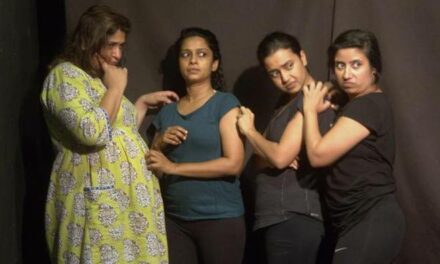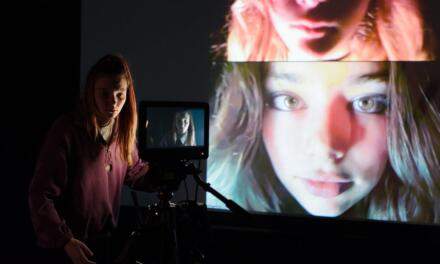Ramps on the Moon’s adaptation of Pete Townsend’s 1969 concept album ‘Tommy’, toured the UK between March and July 2017. With time to let the stardust settle, Jonathan Meth offers a provocation reflecting on the award-winning production.
It is bordering on mealy-mouthed to question the politics as well as the aesthetics of “Ramps on the Moon’s” production of Tommy, when to see so much fantastic talent assembled onstage of acting, singing, dancing and yes, disabled performers were simply joyous – and itself a political statement of intent.
But when will the fabulous advances in theatre made by artists with physical and sensory disabilities come with a dividend for those with a learning disability or autism?
Following a blazing first half, in the second, Tommy is a dramaturgical mess. So, for me, this was an opportunity to really think about what to do and why. Now the fanfares for Tommy have subsided, as a dramaturg I want to advocate a reading which explores the portrayal of autism.
Traumatised by the witnessing of his father’s murder: “liberated” by the act of smashing through the mirror, it turns out the deaf, dumb and blind boy isn’t really deaf, dumb or blind, he was just refusing to communicate.
Like a fairy tale Tommy’s identity is suspended in glass. The metaphor is reflexive between stage and audience.
What happens when you put a mirror onstage?
What happens when you literalize a metaphor?
When Tommy’s senses are tested they first appear to work, then cease to. Nothing to be done, say the medical experts. But as an audience, we see what the doctors apparently do not.
We are constantly on the verge here of learning disability, autism, and neurodiversity. But it remains territory tantalizingly just out of reach. As an audience member, you might make certain associations, but we (onstage) couldn’t possibly comment…
The “cure” which Tommy undergoes is doubly called into question. Firstly by the actor’s actual deafness, made clear to the audience through his signing and his speech patterns, and secondly through a plot mechanism which has the central character reject his new found persona of fame for a physical (non-disablist) authenticity precipitated by the callous (if slightly telegraphed) tipping out of her wheelchair of an Innocent fan by Tommy’s over-zealous entourage. Thus we are offered the mantra to be yourself. And there we are left.
Now, the drugs definitely don’t work in the second half of Tommy, and never have: neither as concept album, film, nor musical. Dramaturgically it’s a victory for the Acid Queen as the plot literally trips out.
While the symptoms of deafness, dumbness, and blindness are different from those of autism, when they are portrayed on stage they can be understood by an audience in a very similar way.
In rejecting a cure, Tommy could have struck a blow for those who want to “fix” autistic people, and more deeply contest the normative trope.
In (newly) creating the ghost of his father as the staged embodiment of Tommy’s guilt, to which he clings and which keeps him largely infantilized, this stage adaptation reaches for a device to offset the “problematic” of Tommy’s disability and cushion the miraculous nature of his cure. In pushing the psychological trauma it returns disability to a metaphor, which it then seeks to undercut in the audience’s mind, by juxtaposing the talent of the disabled performers.
What happens if you make the dramaturgical choice to portray Tommy as autistic? The changeling element of “the boy appeared to be developing normally, but now he isn’t”, works well. What about the smashing of the mirror? This is linked to the emotional trauma suffered by Tommy as a young boy and enables his supposed emancipation, but “with his senses restored”, Tommy actually only finds solace by escaping from all forms of human interaction.
For Tommy, the pinnacle is actually his arch-stimming (1): pinball. The fact that his hyperdexterity (2) causes mass adulation is a fantastic dramatic conceit in that it straddles the gap between demonized transgressive character behavior (thou shalt not stimm) and superstar status afforded those with extreme talents: aka the autistic savant.
In Russell’s film version, Tommy eschews the trappings of religion, capitalism and gets back-to-nature in a way in which both Goethe and Rousseau would be proud. It’s all about mountains, streams and communing with setting suns. The hippy idealism of individual freedom liberated from the commodity fetishism of capitalism.
Everyone loves a walkdown, which is the equivalent of Roger Daltrey with his gorgeous bared chest and tight pants, climbing mountains and walking through streams, but Tommy needs an ending for now.
It was great to see the production deconstructing cripping-up with an Oscar parody worthy of Mandy Colleran and the late, great Sophie Partridge. But what if you could dramatize the difference between the medical and social models of disability? What if the audience journey – as well as those of the characters onstage – is to accept Tommy as his autistic self?
Notes
1 Stimming is short for self-stimulatory behaviour. This behaviour can be interpreted as a protective response to being overly sensitive to stimuli or as a way to relieve anxiety. It is characterised by the repetition of physical movements, sounds, or repetitive movement of objects. For some taking a therapeutic approach, stimming is viewed as socially unacceptable and to be discouraged.
2 hyperdexterity is a coining of my own to suggest a medicalised term to represent Tommy’s extreme ability to flip pinball flippers.
Ramps on the Moon is a strategic initiative involving a consortium of six theatres: Birmingham Repertory Theatre, Nottingham Playhouse, Sheffield Theatres, Theatre Royal Stratford East, and West Yorkshire Playhouse in collaboration with Graeae Theatre Company whose aim is to address the under-representation and employment of disabled people within mainstream theatre. A production of Timberlake Wertenbaker’s Our Country’s Good is due to begin a tour at Nottingham Playhouse on 9-24 March. For full details visit the Ramps on the Moon website
This article was originally posted on Disability Arts. Reposted with permission. Read the orginal article
This post was written by the author in their personal capacity.The opinions expressed in this article are the author’s own and do not reflect the view of The Theatre Times, their staff or collaborators.
This post was written by Jonathan Meth.
The views expressed here belong to the author and do not necessarily reflect our views and opinions.


















